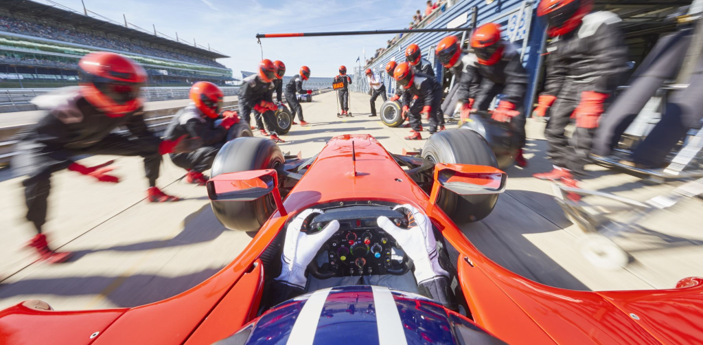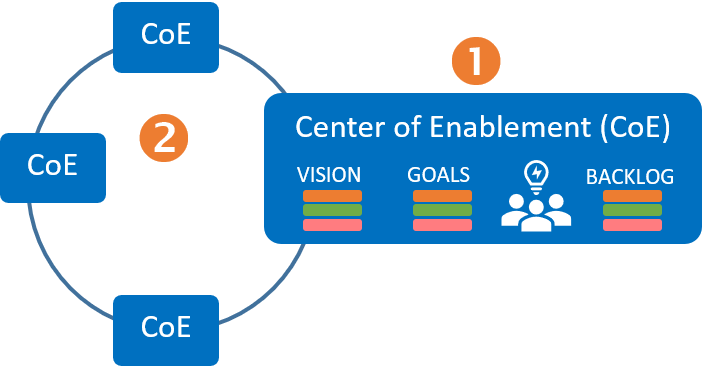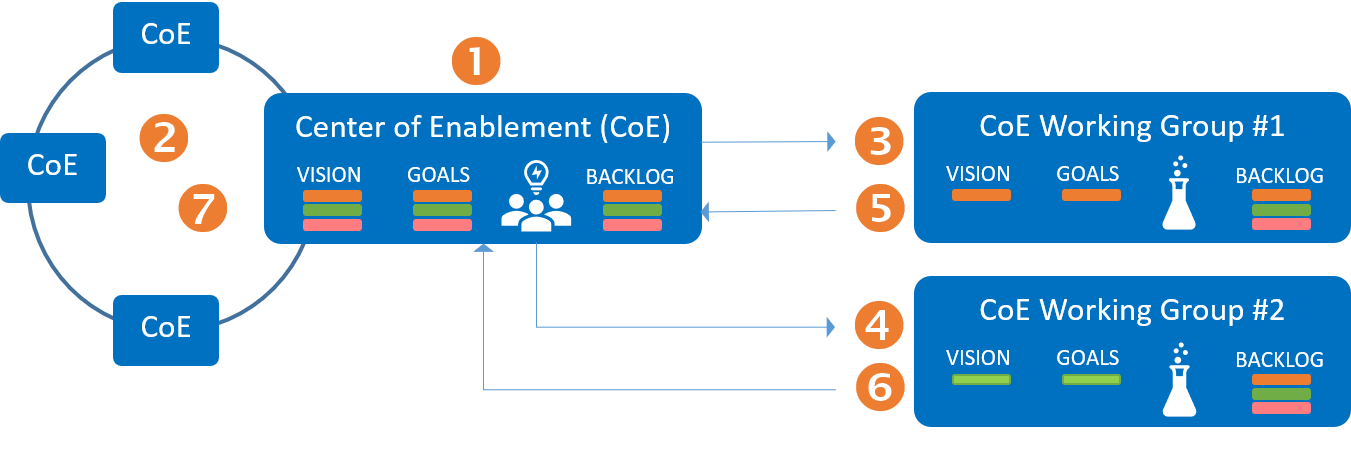When we launched our Center of Enablement (CoE), Dojo, Townhall, Working Group, and Community of Practice (CoP) ceremonies, we triggered vibrant collaboration (which is good) and created confusion (which is bad) with working groups. In the An overview of our key collaboration ceremonies we described the difference between the ceremonies, the importance of the terms of reference (why are we here), and the process of creating one or more of the ceremonies.
What is the difference between a working group and a CoE Working group?
A working group is a group of people working together to collaborate and achieve specified goals. The lifespan of a working group can last anywhere between minutes to years, although we strongly recommend the shorter the better mindset.
If you are referring to this generic type of working group, you can spin one up whenever you need to.
A CoE working group is sponsored by one or more Centers of Enablement, its terms of reference (vision, goals, hypothesis) a subset of and supporting the CoE terms of reference. In other words, there is a strong dependency between a sponsoring and other collaborating CoEs.
If you are referring to the CoE working group, you need a CoE to spin up a short-lived CoE Working Group.

Think of the CoE as the Ferrari racing team (long-lived) and the CoE Working Group as the team that performs one of the pit stops (short-lived). The CoE cannot succeed without the CoE Working Group and relies heavily on their feedback to improve.
Let us look at the CoE flow of value

(1) - A Centre of Enablement (CoE) is created to assemble people from different disciplines to collaborate and enable our organization to shift across multiple disciplines to create a place where the highest standards are maintained. Every CoE is a coalition for change, made of these pillars:
- Provide thought leadership, vision, and direction.
- Provide good practice and guardrails (aka governance).
- Establish collaboration with key stakeholders and other CoEs to abolish silos.
- Trigger working groups, dojos, and community of practices to implement research, education, and outcomes.
(2) - All CoE synchronize on a regular basis to exchange learnings, failures, and ensure that as a whole, the CoEs bubble up to a common vision for the organization.

(3) and (4) - The CoE triggers one or more CoE working groups, each focused on a subset of the CoE goals, their backlogs linked to he CoE backlog, and their vision supporting the CoE's vision. Every CoE working group is:
- Short-lived! - The working group's lifetime is limited to the CoE's lifetime and a maximum of 2 program increments (10 weeks). See FAQ for more details.
- Laser focused! - Focus on experiments, (dis)prove hypothesis, make recommendations, and minimal viable products.
- A slice! - Take baby steps, focus on a vertical slice, and do not try to solve the world's problems.

(5) and (6) - Information flows from the CoE Working Group back to the CoE, where it is vetted and consolidated into the CoE knowledgebase.
(7) - Each CoE will synchronize and exchange the learnings from the working groups during the Co
FAQ
What happens when a CoE is terminated?
When we terminate a CoE, all associated CoE Working Groups, CoE Dojos, and CoE Community of Practices are terminated as well. All learnings, failures, etc. are maintained for future reference.
What happens when a CoE Working Group's lifetime expires?
We terminate the working group, perform a retrospective, and optionally spin up a new working group to complete the work, if and only if it still deemed valuable. THe intentionally limit the lifetime of working groups to keep them focused and energized.
What happens at a +1 Townhall?
We present the overall health of our collaboration, experimentation, and innovation ecosystem, as well as an update and optional demos by each active CoE.
Any other questions?
